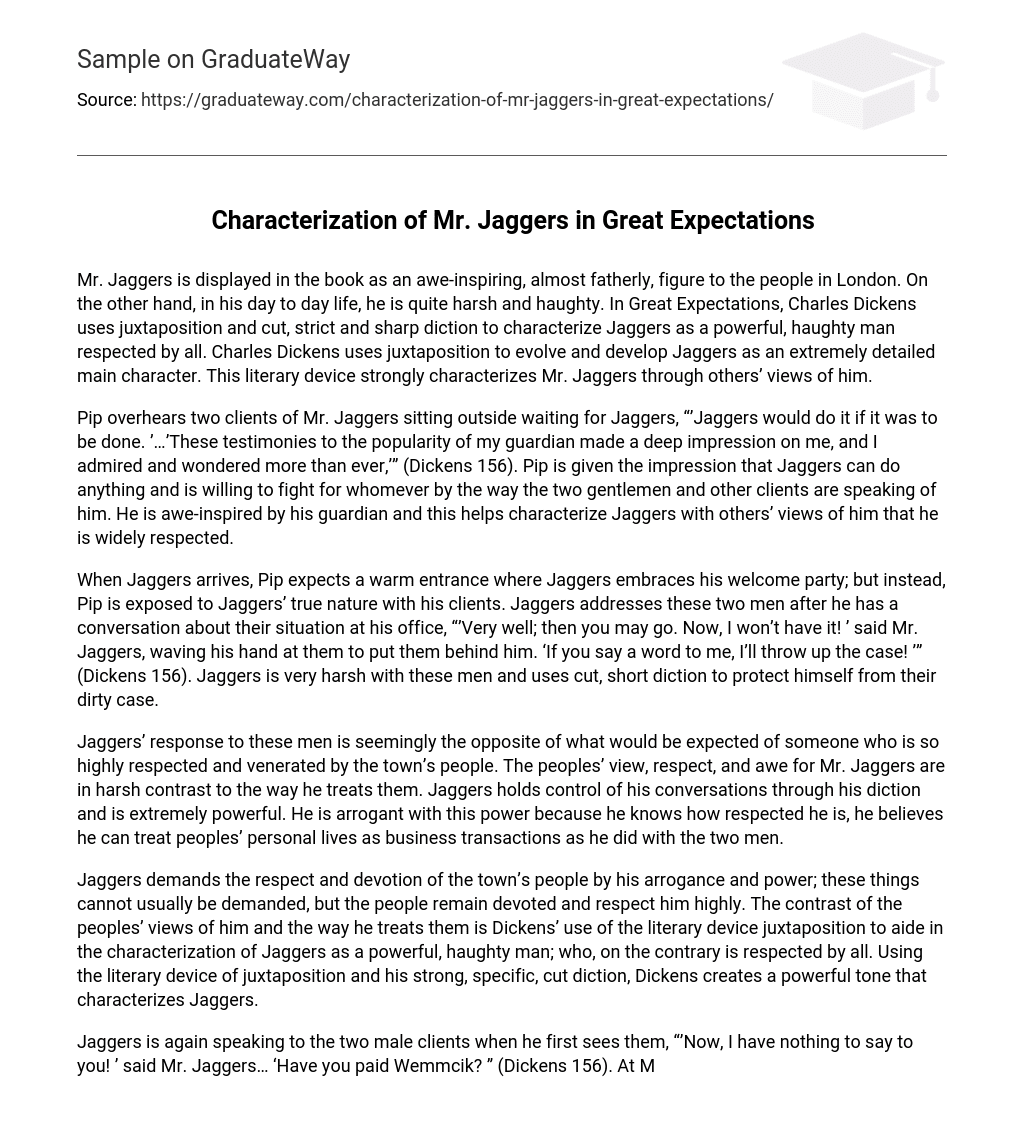Mr. Jaggers is displayed in the book as an awe-inspiring, almost fatherly, figure to the people in London. On the other hand, in his day to day life, he is quite harsh and haughty. In Great Expectations, Charles Dickens uses juxtaposition and cut, strict and sharp diction to characterize Jaggers as a powerful, haughty man respected by all. Charles Dickens uses juxtaposition to evolve and develop Jaggers as an extremely detailed main character. This literary device strongly characterizes Mr. Jaggers through others’ views of him.
Pip overhears two clients of Mr. Jaggers sitting outside waiting for Jaggers, “’Jaggers would do it if it was to be done. ’…’These testimonies to the popularity of my guardian made a deep impression on me, and I admired and wondered more than ever,’” (Dickens 156). Pip is given the impression that Jaggers can do anything and is willing to fight for whomever by the way the two gentlemen and other clients are speaking of him. He is awe-inspired by his guardian and this helps characterize Jaggers with others’ views of him that he is widely respected.
When Jaggers arrives, Pip expects a warm entrance where Jaggers embraces his welcome party; but instead, Pip is exposed to Jaggers’ true nature with his clients. Jaggers addresses these two men after he has a conversation about their situation at his office, “’Very well; then you may go. Now, I won’t have it! ’ said Mr. Jaggers, waving his hand at them to put them behind him. ‘If you say a word to me, I’ll throw up the case! ’” (Dickens 156). Jaggers is very harsh with these men and uses cut, short diction to protect himself from their dirty case.
Jaggers’ response to these men is seemingly the opposite of what would be expected of someone who is so highly respected and venerated by the town’s people. The peoples’ view, respect, and awe for Mr. Jaggers are in harsh contrast to the way he treats them. Jaggers holds control of his conversations through his diction and is extremely powerful. He is arrogant with this power because he knows how respected he is, he believes he can treat peoples’ personal lives as business transactions as he did with the two men.
Jaggers demands the respect and devotion of the town’s people by his arrogance and power; these things cannot usually be demanded, but the people remain devoted and respect him highly. The contrast of the peoples’ views of him and the way he treats them is Dickens’ use of the literary device juxtaposition to aide in the characterization of Jaggers as a powerful, haughty man; who, on the contrary is respected by all. Using the literary device of juxtaposition and his strong, specific, cut diction, Dickens creates a powerful tone that characterizes Jaggers.
Jaggers is again speaking to the two male clients when he first sees them, “’Now, I have nothing to say to you! ’ said Mr. Jaggers… ‘Have you paid Wemmcik? ” (Dickens 156). At Mr. Jaggers’ first sight of these men, he immediately uses his strong and cut diction. Punctuation, a form of diction, characterizes Jaggers with his voice inflection; when Dickens uses exclamation points in Jaggers’ speech, and the italicized “you” in the quote, they depict the commanding tone in his voice.
He becomes very specific and to the point with his diction getting straight to his foremost objective: money. In multiple sections of the book, Dickens characterizes Jaggers by bringing up money early into a conversation. This adds to his arrogance saying that his personal wealth is worth more than what the people have to say. These examples of specific diction keep him in charge of every conversation; Dickens uses these powerful words to characterize Mr. Jaggers as a powerful, haughty man. Mr. Jaggers spoke to two women, one of whom has a husband that is in trouble and Mr.
Jaggers had represented him, “’And do you remember,’ retorted Mr. Jaggers, ‘that but for me you wouldn’t be here and couldn’t be here? ’… ‘Oh yes sir! ’ exclaimed both women together. ‘Lord bless you, sir, well we knows that! ’” This is another example of Jaggers harshness in contrast to the women’s respect. One of these women was weeping and Jaggers overlooks her and demands their thankfulness; he is guilt-tripping these women and it is creating a powerful and serious tone with Dickens carefully cut and sharp diction.
The diction is sharp in the sense that he shows little remorse and takes barely any time to speak to these people below him. Mr. Jaggers’ serious tone and short diction that demands respect strongly characterize him as haughty and powerful. The women’s willingness to fawn at his feet gives example of the way he is characterized as truly and deeply respected. Charles Dickens’ use of cut, strict, sharp, and strong diction using punctuation, voice inflection, specific speech, and shortness of sentences aide in the characterization of Jaggers as a powerful, haughty man respected by all.
Dickens uses many literary devices and forms of diction to characterize the people in his novel. In Great Expectations, Charles Dickens uses juxtaposition and cut, strict and sharp diction to characterize Jaggers as a powerful haughty man respected by all. With the use of these methods of characterization, there is a better understanding of the characters within the book, and, the book itself.





